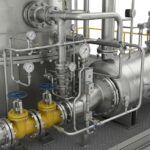Table of Contents
What is Pipeline route surveys & Major Specifications?
Pipeline route surveys are performed to determine the feasibility of a proposed pipeline route and to identify any potential environmental or social impacts that may affect its construction and operation. The following are some of the specifications for a pipeline route survey:
Don’t forget to Login to earn rewards while reading this article
Login Here
- Survey Methodology: The method of survey, such as aerial, ground-based, or remote sensing, must be determined, and a detailed survey plan must be developed.
- Data Collection: Collection of data on topography, geology, hydrology, land use, and cultural resources, among others, should be carried out.
- Environmental and Social Impact Assessment: The survey should identify and assess the potential environmental and social impacts of the pipeline route, including impacts on wildlife, habitats, water resources, and communities.
- Stakeholder Engagement: The survey should involve engagement with stakeholders, such as landowners, communities, and government agencies, to gather information and feedback on the proposed route.
- GIS Mapping: Geographical Information System (GIS) mapping should be used to display the data collected and to support the assessment of the pipeline route.
- Risk Assessment: A risk assessment should be conducted to identify and assess the potential risks associated with the pipeline route, including technical, environmental, and social risks.
- Reporting: A comprehensive report summarizing the survey results and recommendations should be produced and submitted to relevant stakeholders.
- Compliance: The survey must comply with relevant legislation and regulations, such as environmental protection and cultural heritage legislation.
- Quality Control: A quality control plan should be in place to ensure the accuracy and consistency of the data collected and the analysis performed.
- Review and Update: The survey results should be reviewed and updated as needed to reflect any changes in the pipeline route or conditions.
Attempt Quiz on Pipeline Route Survey
1. What is the primary objective of pipeline route surveys?
Choose the correct answer:
Explanation: The primary objective of pipeline route surveys is to identify the most feasible and safe route for the pipeline, taking into consideration various environmental, economic, and social factors.
2. What are the major responsibilities of a pipeline route surveyor?
Choose the correct answer:
Explanation: The major responsibilities of a pipeline route surveyor include assessing environmental impacts, obtaining necessary permits, and ensuring compliance with regulations.
3. What is a major outcome of a pipeline route survey?
Choose the correct answer:
Explanation: A major outcome of a pipeline route survey is a comprehensive route map and feasibility report, which provide detailed information on the chosen route and its viability.
Major responsibilities of Pipeline route Surveyor?
A pipeline route surveyor is responsible for conducting surveys to determine the feasibility and impacts of proposed pipeline routes. The following are some of the major responsibilities of a pipeline route surveyor:
- Develop Survey Plan: Develop a detailed plan for the pipeline route survey, including the survey methodology, data collection methods, and stakeholder engagement plan.
- Data Collection: Conduct data collection on the proposed pipeline route, including topography, geology, hydrology, land use, and cultural resources.
- Environmental and Social Impact Assessment: Identify and assess the potential environmental and social impacts of the pipeline route, including impacts on wildlife, habitats, water resources, and communities.
- Stakeholder Engagement: Engage with stakeholders, such as landowners, communities, and government agencies, to gather information and feedback on the proposed route.
- Risk Assessment: Conduct a risk assessment to identify and assess the potential risks associated with the pipeline route, including technical, environmental, and social risks.
- GIS Mapping: Use GIS mapping to display the data collected and to support the assessment of the pipeline route.
- Reporting: Prepare a comprehensive report summarizing the survey results and recommendations and submit it to relevant stakeholders.
- Compliance: Ensure that the survey complies with relevant legislation and regulations, such as environmental protection and cultural heritage legislation.
- Quality Control: Implement a quality control plan to ensure the accuracy and consistency of the data collected and the analysis performed.
- Review and Update: Review and update the survey results as needed to reflect any changes in the pipeline route or conditions.
- Collaboration: Collaborate with other professionals, such as engineers, geologists, and environmental scientists, to ensure that the survey results are comprehensive and accurate.
Major Outcomes of Pipeline Route survey?
The outcomes of a pipeline route survey are critical for the planning and execution of a pipeline project. The following are some of the major outcomes of a pipeline route survey:
- Feasibility Assessment: Determine the feasibility of the proposed pipeline route, including its technical and economic viability.
- Environmental and Social Impact Assessment: Identify and assess the potential environmental and social impacts of the pipeline route, including impacts on wildlife, habitats, water resources, and communities.
- Stakeholder Feedback: Gather feedback from stakeholders, such as landowners, communities, and government agencies, on the proposed pipeline route.
- Risk Assessment: Identify and assess the potential risks associated with the pipeline route, including technical, environmental, and social risks.
- GIS Mapping: Produce GIS maps displaying the data collected and supporting the assessment of the pipeline route.
- Recommended Route: Recommend a preferred pipeline route based on the survey results and stakeholder feedback.
- Report: Prepare a comprehensive report summarizing the survey results and recommendations and submit it to relevant stakeholders.
- Compliance: Ensure compliance with relevant legislation and regulations, such as environmental protection and cultural heritage legislation.
- Baseline Data: Provide baseline data on the proposed pipeline route that can be used to monitor and manage the pipeline during construction and operation.
- Decision-Making: Support decision-making by providing relevant information and recommendations to stakeholders involved in the pipeline project.
Risks Involved in Pipeline route surveys?
Pipeline route surveys can be complex and challenging, and there are a number of risks involved that must be carefully managed to ensure the success of the survey and the overall pipeline project. The following are some of the risks involved in pipeline route surveys:
- Technical Risks: Technical risks such as geotechnical, hydrological, and environmental issues that may impact the feasibility of the pipeline route.
- Environmental Risks: Environmental risks such as impacts on wildlife, habitats, and water resources, and the need to comply with environmental legislation and regulations.
- Social Risks: Social risks such as impacts on communities, stakeholder engagement, and the need to comply with cultural heritage legislation.
- Time and Cost Overruns: Risks of time and cost overruns due to unexpected events or changes in conditions, such as changes in the pipeline route, stakeholder feedback, or the need to conduct additional surveys or assessments.
- Data Accuracy: Risks associated with the accuracy and reliability of the data collected, including the need for quality control and data management processes.
- Stakeholder Relations: Risks to stakeholder relations, such as conflicts with communities or other stakeholders, which may impact the overall success of the pipeline project.
- Compliance: Risks associated with non-compliance with relevant legislation and regulations, including environmental protection and cultural heritage legislation.
- Data Security: Risks to the security of sensitive data collected during the survey, such as confidential information on land ownership or cultural heritage sites.
- Health and Safety: Risks to the health and safety of the survey team, such as working in remote or hazardous environments.
- Political Risks: Political risks associated with changes in government policies or stakeholder attitudes, which may impact the feasibility of the pipeline route.
FAQs on Pipeline Route Surveys & Major Specifications
- What is a pipeline route survey?
- A pipeline route survey is the process of identifying the optimal path for laying a pipeline, considering various environmental, topographical, and socio-economic factors.
- Why are pipeline route surveys important?
- They ensure the pipeline is laid in the most efficient, cost-effective, and environmentally friendly manner, reducing risks and potential issues during construction and operation.
- What are the major specifications considered in pipeline route surveys?
- Specifications include terrain analysis, soil composition, environmental impact, proximity to populated areas, existing infrastructure, and regulatory requirements.
- How is a pipeline route survey conducted?
- It involves preliminary research, field surveys using GPS and GIS technologies, environmental assessments, and consultations with local authorities and stakeholders.
- What technologies are used in pipeline route surveys?
- Technologies include GIS (Geographic Information Systems), GPS (Global Positioning Systems), aerial photography, LiDAR (Light Detection and Ranging), and satellite imagery.
- What environmental factors are considered in pipeline route surveys?
- Environmental factors include wildlife habitats, water bodies, vegetation, protected areas, and potential contamination risks.
- How long does a pipeline route survey typically take?
- The duration can vary widely depending on the project size and complexity but typically ranges from several months to over a year.
- What are the key outcomes of a pipeline route survey?
- Key outcomes include a detailed route map, environmental impact assessment, risk analysis, construction feasibility study, and regulatory compliance documentation.
- What role do local communities play in pipeline route surveys?
- Local communities are often consulted to understand their concerns, gain consent, and ensure the pipeline project respects local customs and land use practices.
- What are the challenges faced during pipeline route surveys?
- Challenges include difficult terrain, adverse weather conditions, regulatory hurdles, and potential opposition from local communities or environmental groups.
25+ Relevant topics on Codes & Standards
Recommended courses (Published on EPCLand)
- Complete Course on Piping Engineering
- Basics of Piping Engineering
- Piping Layout Engineering
- Piping Material Engineering
- Piping Stress Analysis
- Material Requisitions & TBE
- Piping Material Specifications
- Valve Material Specifications
- Plant Design & Layouts-OISD 118
- Isometric Management
Other relevant Links:
- Click here to check the published courses on Piping Engineering
- Click here to attempt Quizzes on Piping Engineering Topics
- Click here to check 1200+ Videos on Piping Engineering
- Click here to Join the Telegram Community of Piping Professionals
- Click here to Prepare for PMP (Project Management Professionals) for Free
Final Takeaway on Pipeline Route Survey
In conclusion, a pipeline route survey is a critical stage in the planning and execution of a pipeline project. The survey is used to determine the feasibility of the proposed pipeline route and assess its potential environmental and social impacts, stakeholder feedback, and technical and economic viability. The survey also supports decision-making by providing relevant information and recommendations to stakeholders involved in the pipeline project. However, there are a number of risks involved in pipeline route surveys that must be carefully managed, such as technical risks, environmental risks, social risks, time and cost overruns, data accuracy, stakeholder relations, compliance, data security, health and safety, and political risks. The successful management of these risks requires a thorough understanding of the project requirements and a robust survey plan that takes into account all relevant stakeholders and considerations.






